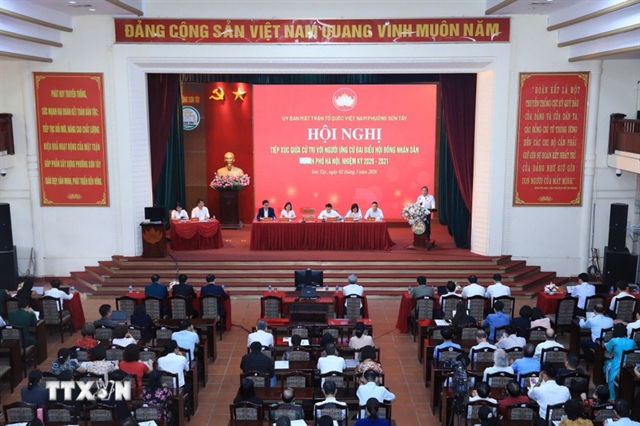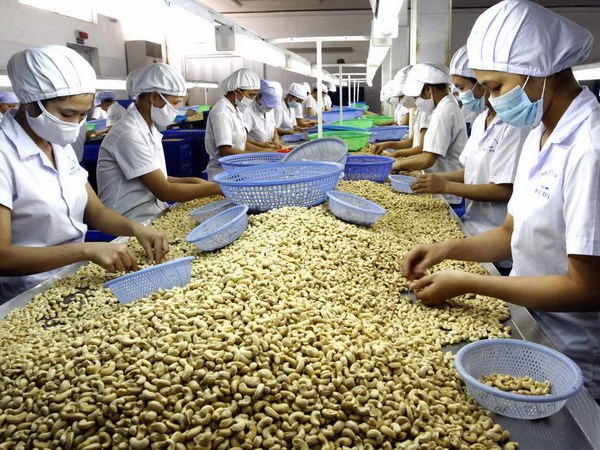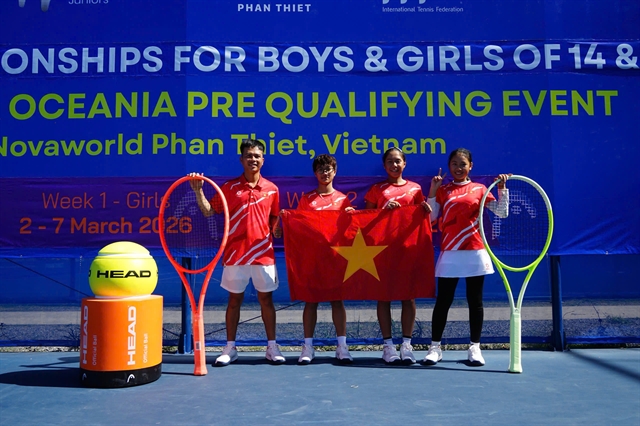 Economy
Economy


|
| Workers process cashew nuts for export at a company in the southern province of Bình Phước. VNA/VNS Photo |
HCM CITY — Vietnamese exporters need to continue to improve the reliability of agricultural products and ensure quality, safety and sustainability to compete globally, industry insiders said.
Phùng Đức Tiến, deputy minister of the Agriculture and Rural Development, said that with a number of free trade agreements (FTAs) Việt Nam has signed, exporters would have greater opportunities to expand export markets.
Of these FTAs, the Regional Comprehensive Economic Partnership (RCEP), which took effect early this year, brings together the 10 ASEAN member countries, along with Australia, China, Japan, New Zealand, and South Korea, which account for 29 per cent of the world’s GDP and have a population of 2.2 billion.
Under the world’s largest trade pact, exporters will have an opportunity to expand export markets, especially in key products such as rice, coffee, pepper, cashew nuts, seafood, timber and wood products.
Nguyễn Phúc Nguyên, general secretary of the Việt Nam Fruit and Vegetable Association, said the trade deal would also increase the country’s agricultural exports to China, already a major market.
The trade pact removes tariffs on at least 64 per cent of tariff lines. In 15-20 years, Việt Nam will abolish 89.6 per cent of tariff lines while its partner countries will remove 92 per cent of its tariffs.
Other ASEAN members will remove 85.9 per cent of all tariffs for Việt Nam.
Challenges
Experts have pointed out major challenges faced by local exporters such as increasingly stricter rules of origin and quality standards and more severe competition from foreign rivals in both the domestic and foreign markets.
Nguyễn Quốc Toản, director of the ministry’s Department of Agricultural Product Processing and Market Development, said another major problem was the weak competitiveness of Vietnamese farm produce.
This is largely because processed agricultural products did not have enough value added content to meet the regulations of the markets, he said.
In the domestic market, Vietnamese agricultural products would also have to compete with those from member states imported into the country.
According to Dr. Nguyễn Đắc Bình Minh, director of the Institute of Regional Research and Development under the Ministry of Science and Technology, the traceability of export products is a mandatory requirement of multilateral FTAs, especially the FTA with the EU.
Accrding to Nguyễn Trung Kiên, head of the ministry’s Department of International Cooperation, the EU is one of Việt Nam’s four major export markets for agricultural, forestry and fishery products.
It is also one of the world’s three largest markets for agricultural, forestry and fishery products.
The EU spends about $1 trillion on food and beverages annually, including $300 billion on imports.
To increase the competitiveness of agricultural exports to the EU, it is important to reduce transportation costs and develop brands.
Low-carbon agriculture
Under the National Green Growth Strategy for the 2021-30 period, the ministry will develop a low-carbon commercial agriculture toward a circular and smart economy, climate resilience, and higher competitiveness for green agro-products.
In a related issue, at the 26th United Nations Climate Change Conference of the Parties, Prime Minister Phạm Minh Chính made a commitment that Việt Nam will strive to achieve net-zero carbon emissions by 2050.
Nguyễn Đức Trường, General Director of Đại Thành Joint Stock Company, said that to achieve the net-zero carbon emission goal by 2050, the agricultural sector would need to apply advanced technologies in production, such as using organic and bio-fertilisers.
Kyle Kelhofer, International Finance Corporation’s Senior Country Manager of Việt Nam, Cambodia and Laos, said, “Việt Nam’s agriculture sector is at a turning point as the sector faces bright opportunities in both domestic and international markets.”
To better compete in the markets would largely depend upon the ability of farmers and firms to deliver agricultural products with reliability, ensuring quality, safety, and sustainability, he said.
“Transformation to a low-carbon, green and sustainable growth path will be key to making this happen,” he added.
Việt Nam’s import-export value of agricultural, forestry and aquatic products reached $58.3 billion in the first seven months, up 7.2 per cent year-on-year, according to the ministry.
Of the figure, exports were worth $32.3 billion, up 12.2 per cent year-on-year, and imports were worth $26 billion, up 1.6 per cent.
So far this year, Việt Nam’s trade surplus has grown to $6.3 billion in agriculture, forestry and fishery products, nearly double that of the same period last year.
Vietnamese agricultural products have been exported to over 190 countries and territories around the world, with exports reaching $48.6 billion last year and are forecast to reach in excess of $55 billion this year. — VNS




